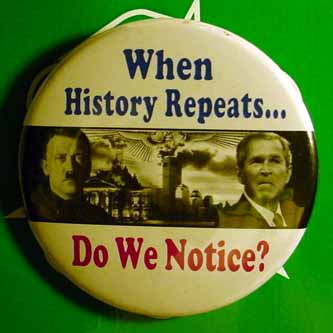
The New Pearl Harbor us a short book by David Ray Griffin (168 pages) that catalogs the problems bubbling around in the alternative media about the official narrative of what happened on 9/11. Things like "Why weren't the warnings that preceded the attack heeded?", "Why weren't the planes that hit the WTC intercepted?", "Why did the Bush Administration stonewall the investigation?", and "Doesn't it seem a bit suspicious that they had plans in place to take advantage of 'a new Pearl Harbor' to attack Afghanistan and Iraq?"
The strike on the Pentagon looks particularly suspicious when examined closely. For one thing, the hole does not seem to be big enough to have been made by a 757, and there were no big pieces of airplane in any of the pictures of the scene taken at the time. For another thing, the transcript of the flight recorder ends twenty minutes before "the plane hit the building." It is also quite difficult to hit the building in such a way that less lives are lost. Why? Rather than answer these questions, the author calls for a complete investigation of the matter.
The book documents in considerable detail numerous warnings about the attack that the government received and ignored. FBI agents in Minneapolis, Minnesota and Phoenix, Arizona submitted warnings to higher ups that were dismissed and later turned out to be accurate. Large put options were traded on the stocks of American Airlines and United Airlines, just days before the attack was executed using their planes. (Apparently whomever made those deals kept the millions of dollars they made on the trade and was never investigated.) An arms dealer told the CIA in '99 that the twin towers would come down. After reading that section I had a strong feeling that something could have been done but wasn't.
The last part of the book is a discussion of why it could be that there was more going on than incompetent bungling by bureaucrats. For one thing, the payoff for Bush Administration campaign contributors from an oil pipeline across Afghanistan would be huge. Control of Iraq's oil also has vital strategic consequences. The author points to the PNAC document that explained the need for "a new Pearl Harbor" event to get the political will of the American people behind these adventures, which 9/11 helped a lot with. He also points out that the people that ignored the FBI warnings were promoted for their work instead of being fired, which you would expect if they were being measured by their service to the general public.
I went into reading the thing feeling troubled about what is going on in Washington, and I came out feeling even more disturbed. If you need to see why more questions need to be investigated than the official 9/11 commission got around to asking, this book is for you.
Tian Harter, August 23, 2004
I mailed my copy to an old friend in Maryland that wanted to read it after I finished the thing.
Charlotte responded to the above by commenting:
>I read that book and was impressed at first but after I heard him
on Democracy Now, I think
>his arguments (like that the towers had to have been blown up) were
pretty much discredited.
